 Charlie Cahoon is an Extension weed specialist and assistant professor at North Carolina State University. His research focuses on developing innovative and sustainable weed management solutions for corn and cotton. Additionally, at the forefront of his research are management of herbicide-resistant common ragweed, horseweed, Palmer amaranth, and Italian ryegrass and preemptive measures for preventing herbicide resistance. He is also committed to promoting proper stewardship of new herbicide technologies. Cahoon received both his BS and PhD from North Carolina State University. His graduate work was conducted under the direction of Alan York and David Jordan and focused on herbicide-resistant Palmer amaranth management in cotton.
Charlie Cahoon is an Extension weed specialist and assistant professor at North Carolina State University. His research focuses on developing innovative and sustainable weed management solutions for corn and cotton. Additionally, at the forefront of his research are management of herbicide-resistant common ragweed, horseweed, Palmer amaranth, and Italian ryegrass and preemptive measures for preventing herbicide resistance. He is also committed to promoting proper stewardship of new herbicide technologies. Cahoon received both his BS and PhD from North Carolina State University. His graduate work was conducted under the direction of Alan York and David Jordan and focused on herbicide-resistant Palmer amaranth management in cotton.
 Camp Hand is a PhD student studying weed science under the direction of Stanley Culpepper at the University of Georgia. Camp’s research projects have focused on reducing selection pressure for dicamba resistance in Palmer amaranth through integrated weed management strategies in cotton, tolerance of multiple vegetable crops to 2,4-D or dicamba applied over plastic mulch prior to planting, and herbicide-tolerance studies in cereal rye for grain production. Camp received his BS and MS degrees at Auburn University in horticulture while minoring in agronomy. His graduate work at Auburn was conducted under Wheeler Foshee, and it focused on weed control in watermelons and pecans.
Camp Hand is a PhD student studying weed science under the direction of Stanley Culpepper at the University of Georgia. Camp’s research projects have focused on reducing selection pressure for dicamba resistance in Palmer amaranth through integrated weed management strategies in cotton, tolerance of multiple vegetable crops to 2,4-D or dicamba applied over plastic mulch prior to planting, and herbicide-tolerance studies in cereal rye for grain production. Camp received his BS and MS degrees at Auburn University in horticulture while minoring in agronomy. His graduate work at Auburn was conducted under Wheeler Foshee, and it focused on weed control in watermelons and pecans.
